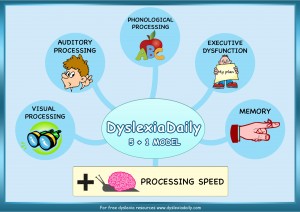There are five main reasons a child can struggle to learn.
 Visual processing skills
Visual processing skills- Auditory processing skills
- Phonological processing skills
- Poor memory skills
- Organisational skills
And the +1 is Slow processing skills which can be a factor in all of these sensory and neurological areas.
This does not mean that a child will have poor eyesight or poor hearing. Nor does it mean that some aspects of their memory won’t be excellent or that they will never be organised. The term ‘learning difficulties’ is generally applied to students in a school setting, where reading, writing, sitting at a desk and regurgitating facts for tests and exams… rules.
Of the six reasons listed above all can be assessed relatively easily. You should always start with a basic eye and hearing test. If visual processing and auditory processing are still an issue, further testing options are available.
Check the Dyslexia Daily Learning Difficulties Directory for service providers.
 Phonological processing skills are skills which relate to learning to speak, read, write and spell. More specifically we are talking about the sound and symbol relationships of the letters in words.
Phonological processing skills are skills which relate to learning to speak, read, write and spell. More specifically we are talking about the sound and symbol relationships of the letters in words.
Memory skills come in many forms; short term, long-term, working memory, auditory memory, visual memory and the list goes on. The best place to look for assistance in this area is via a speech and language pathologist, an educational psychologist or a neurologist. Some teachers with postgraduate qualifications in learning difficulties may also be able to assist you.
Organisational skills, also known as executive dysfunction, are an issue for many children. These children will have difficulty organising their thoughts, processes and belongings. An organisational psychologist would be of value here.
Slow processing skills is the big one. It’s the reason most students need more time on tests and exams. The highly intelligent student who has studied hard and knows the answers to all of the questions on their test or exam, but still runs out of time, can find final exams heartbreaking. The number of questions they had time to answer, is often directly indicative of their result. Even though most could have achieved 90-100% if extra time had been allowed. This is where the current education system lets children with learning difficulties down.



















Thank you so much, some of this information is really useful. I intend to display the posters on our dyslexia board in the staff room where we regularly leave helpful hints and tips for staff to help dyslexics in the classroom. June